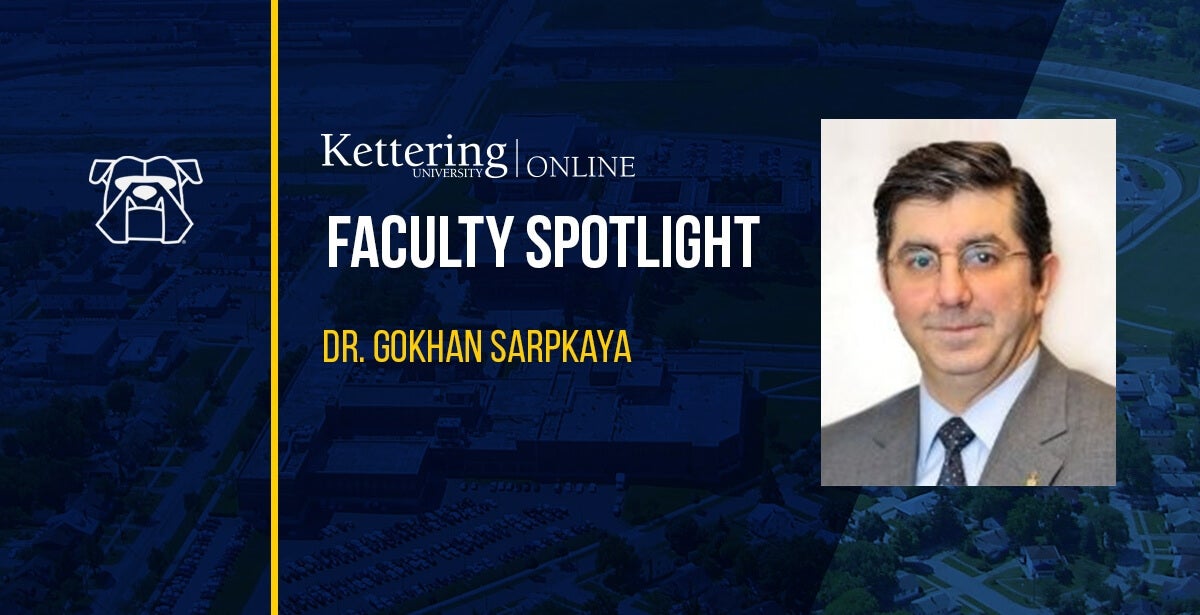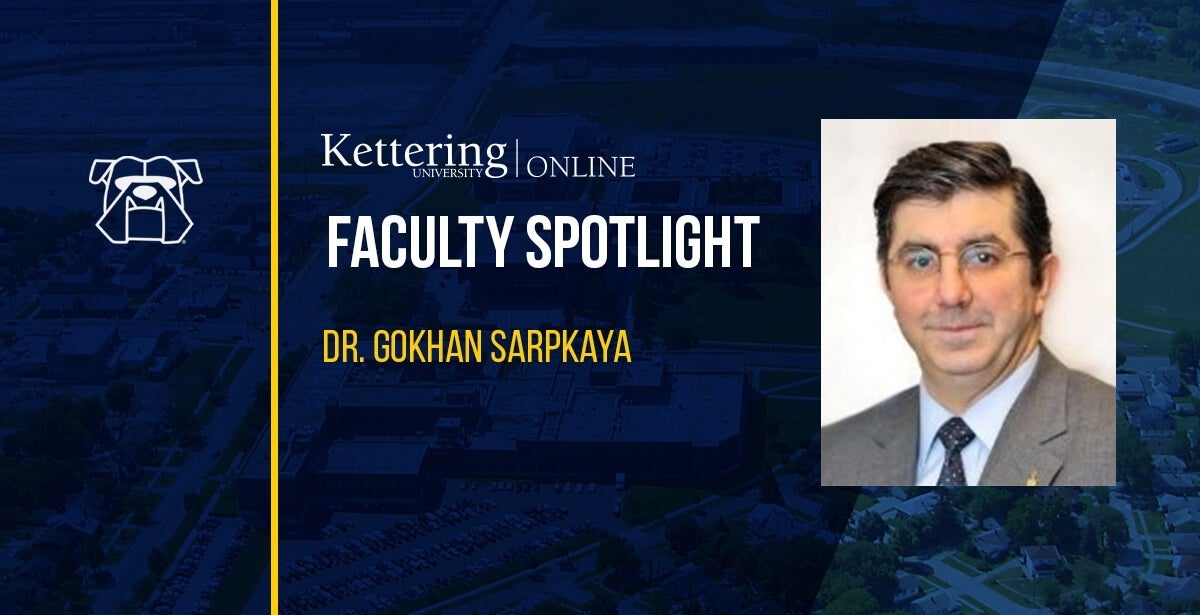
Interview with Faculty member: Gokhan Sarpkaya
Kettering University Online students are working on their graduate programs from locations around the globe. Our instructors are also working from around the world and delivering their international experiences to our students. Gokhan Sarpkaya, Ph.D. is a contributing faculty member for Kettering’s M.S. Lean Manufacturing program. Originally from Turkey, Dr. Sarpkaya still takes pride in the work he has done with the Turkish Naval Academy and its students. He recently attended Kettering's graduation, where he greeted his online students with hearty hugs and shared his enthusiasm for their success. Here he shares when he fell in love with Lean concepts and how he develops fruitful relationships with his online students.
Dr. Sarpkaya teaches at Kettering University Online’s one-of-a-kind Master of Science in Lean Manufacturing program.
ABB: What degrees do you hold and from where?
GS: BSEE, Turkish Naval Academy, MS Industrial Engineering, University of Pittsburgh, & Ph.D. Industrial and Systems Engineering, Auburn University
ABB:What is your teaching philosophy?
GS: I love to apply the textbook and theoretical knowledge to real-world projects and challenges. I like to channel students’ knowledge and past expertise into the problems they must solve for class. When they graduate, they will know how to use their textbook information for their jobs. I like to be really hands-on. One of the reasons students are getting this master’s degree is to get a little more bump in their benefits, such as a better title, more time off, a promotion, or a salary increase. They need some kind of practical and useful information to earn that bump. In their courses, they may work on group projects and real problems from their workplaces. This allows students to fuse the textbook knowledge with their work.
ABB: Tell us about the moment you fell in love with Lean?
GS: I fell in love with lean in the 90s. I was on my first transatlantic flight. I was amazed at the speed and quality of the service of the attendants to hundreds of passengers. Out of a very small galley, they prepared and fed everyone. I fell in love with the methodology and the toolbox it provides. Lean is not only about manufacturing. It’s the science of common sense. Simple tools that make your life easier, and you suffer less.
ABB:Why do you teach online?
GS: I would like to die standing (hearty laugh). I came to this country when I was 33 years old, and I am always planning for my retirement. I expose myself to lots of different settings and companies in both service and manufacturing, so I can help more types of companies solve their problems. This helps me fulfill my purpose to help others and to have a plan for the future.
ABB: How long have you been teaching online?
GS: Almost two years.
ABB:What has surprised you most about teaching online?
GS: The amount of interaction with students. It takes effort, but if I invest effort and time into building relationships with students, it pays back tremendously. For me, the best payback is when I see them at graduation and hug them and meet their families. This gives you a sense of belonging. You feel like you belong to this big, global family, and you're finally meeting. It’s like a big family reunion.
ABB:What tools do you use to connect with your students in a virtual classroom?
GS: I launch virtual office hours at the beginning of each course. I ask ice breaker questions such as where is their dream vacation destination? This gets students out of their shells and gives us hints about their personalities. You see what their passion is about. I give them my phone number, and I typically open the door to connect on LinkedIn. One extra benefit, if you’re looking for a job, I have tons of good connections and will connect you with them. Networking is a lifetime activity. If they need me, I’m there always. That’s part of my life learning purpose, and they help me fulfill that purpose. Some students really take the opportunity and run with it, asking for recommendations or consulting help. I always say that for a lobster dinner, I can do anything (another hearty laugh).
ABB: What were your first thoughts about teaching online?
GS: I would call them “anxieties” more than thoughts. The main challenge when I started was to understand and be able to apply the guidelines of online teaching. My concerns were about the rigor of the assignments. I wondered how to prevent plagiarism and how to build a robust classroom environment with minimal contact. Dr. Wallace (VP Kettering Global) assured me of the quality of Kettering’s courses. Once I learned to use the system and online tools effectively, I overcame these anxieties.
ABB:How did you come to teach for KUO?
GS: LinkedIn and networking have proven itself to be useful. I received an email from Kettering asking if I would be interested in teaching online. They invited me to a 2-week training. Fortunately, I’ve been lucky to one of the faculty here. I believe that is karma. When you give good to the universe, it comes back to you.
ABB:How would you describe your Kettering students?
GS: The majority of the time, I feel their workload is heavy. All of them are working adults. On top of their job responsibilities, they have family responsibilities. They are experiencing life-changing events. Regardless, they are still very professional. This tells me they are persistent adults obtaining their degrees, and they are very responsible. If you approach them effectively, and if you build the communication channels, things go great. But that is my responsibility. I have to build the right bridge from the right materials for each student. I try to learn what they do, where they live, and their passion. If you invest time and effort and love and passion, if you input those in the right amounts, the output is good.
Click here to learn more about Kettering University Online’s programs and how you can connect with instructors like Dr. Gokhan Sarpkaya.

